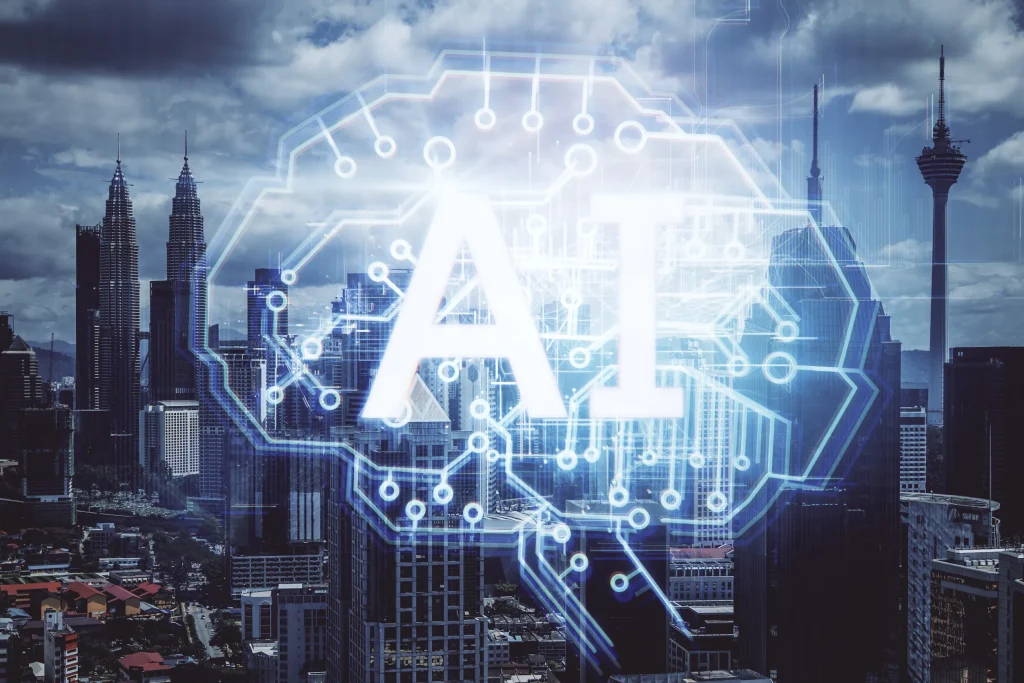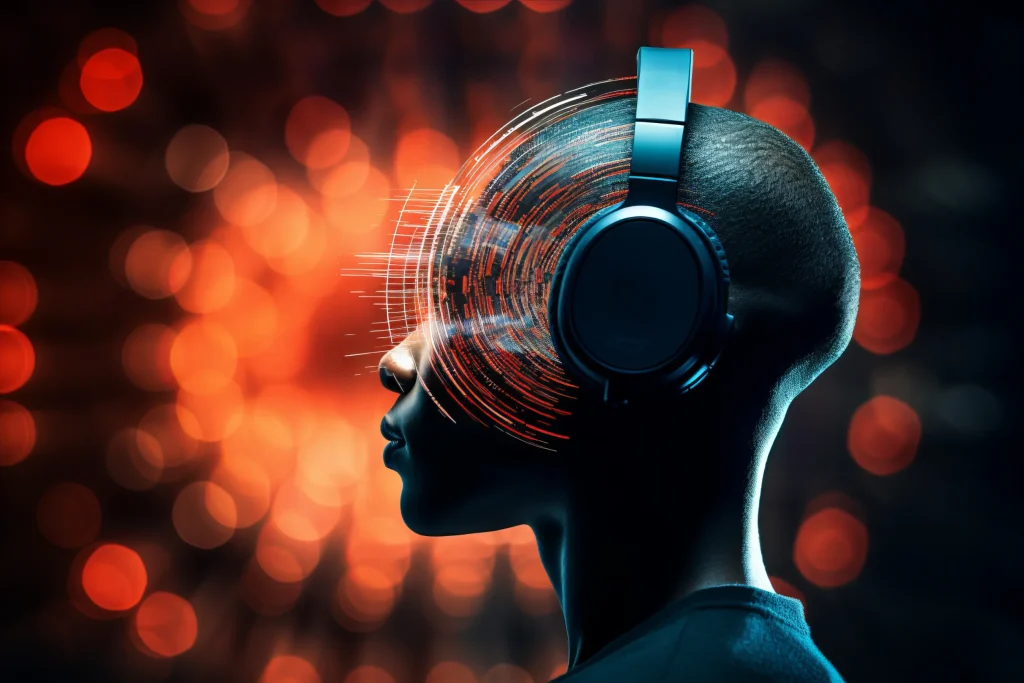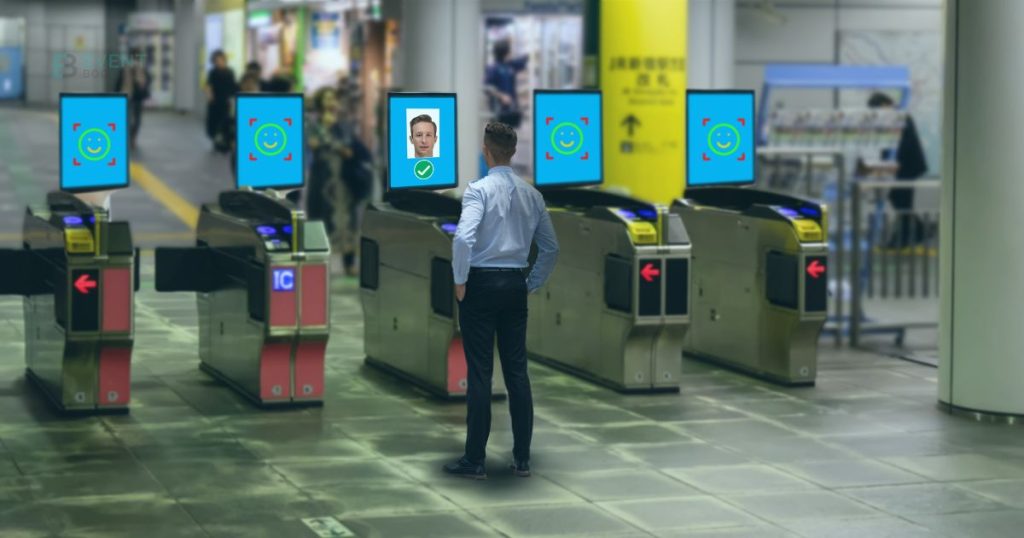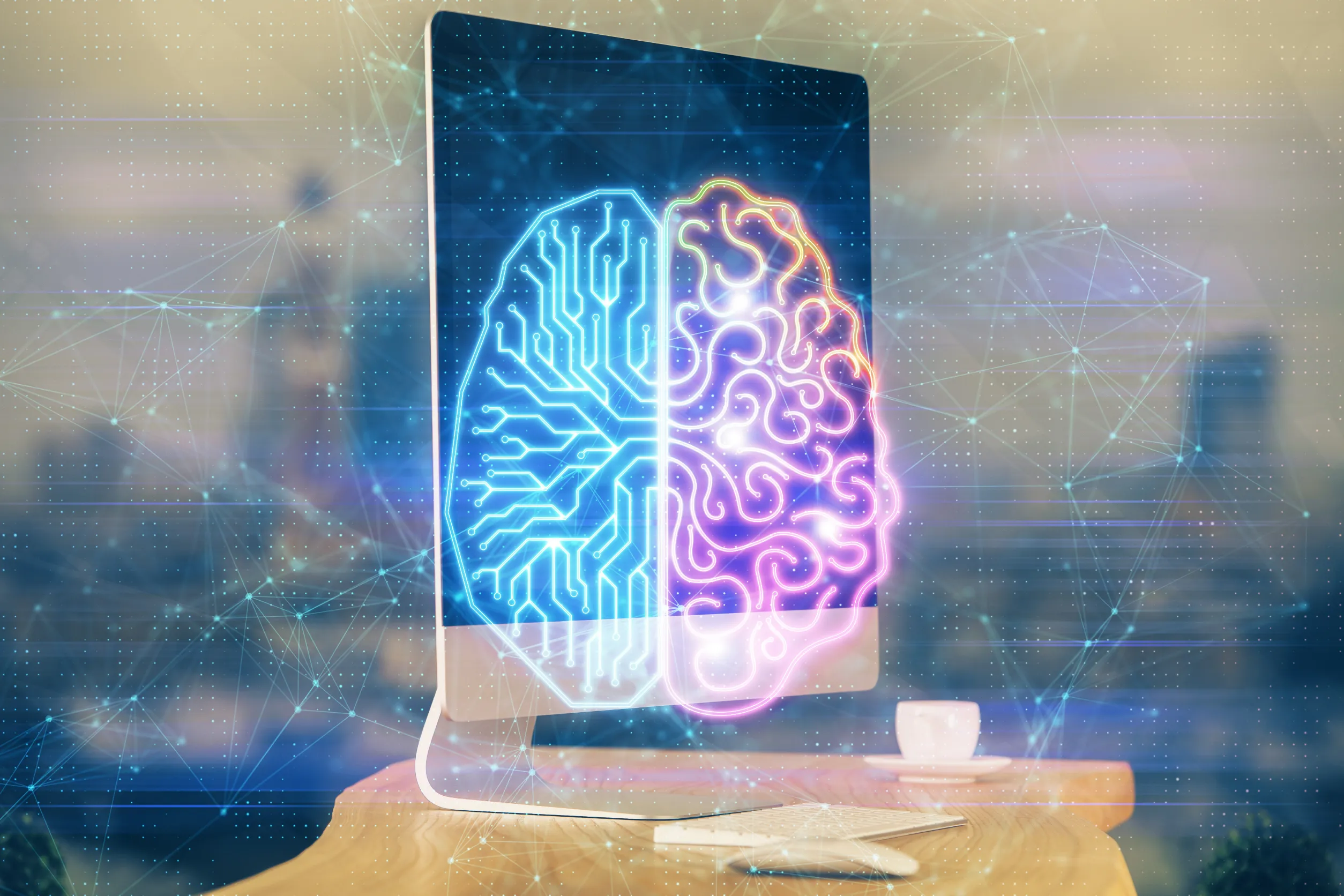The application of artificial intelligence in events is rapidly expanding as they get more complicated. AI in events has the potential to simplify and optimise every step of the process, from promotion and planning to execution and analytics. As an event manager, you might wonder, “How do I use AI?”. Don’t hesitate any longer if you want to take full advantage of this new technology and are unsure how to use AI for event planning and execution. This article explains clever ways to make the most of AI during events.
What is artificial intelligence?

The development of computers and computer systems that can carry out operations that usually require human intelligence, such as thinking, problem-solving, decision-making, and language comprehension, is known as artificial intelligence (AI). Recent years have seen a significant advancement in AI technology, which is currently incorporated into various sectors and industries, including event management and planning.
Artificial intelligence technology can completely transform the event management and planning sector by fostering better participation and communication. AI may also assist event planners by automating processes and providing insightful data on attendee behaviour and preferences. Indeed, organising and managing events has never been simpler, thanks to artificial intelligence capabilities.
It will be interesting to watch how AI technology develops and is applied to the events sector to produce more effective and exciting experiences for all. See some use cases and examples of artificial intelligence in events below.
A practical guide to using AI in events
Event planners and marketers are quickly adopting AI-based solutions because of their ability to automate repetitive tasks, provide templates for event promotions, and provide insightful data. The upcoming AI Marketing Conference 2024 will help event marketers fully utilize AI. It will also help to understand all the issues and risks around governance, ethics, and intellectual property protection in terms of using AI. We have compiled a hand-picked list of innovative AI event applications below.
Event planning
AI event suggestions
Artificial Intelligence can examine attendance records and offer tailored suggestions for events relevant to specific patrons. Utilise recommendation engines driven by AI to provide guests with relevant sessions or speakers depending on their interests. This can enhance the overall event experience by raising client engagement and attendance.
AI custom event agenda
Event planners can use AI to identify schedule conflicts, analyse event data, and optimise the event agenda for optimal efficiency, resulting in more efficient event calendars.
For instance, you may use ChatGPT to create event schedules by uploading information from past events and other pertinent elements unique to the event you are organising. This could contain the name of the event, the dates, the venue, and the preferred subjects.
Event scheduling powered by AI
Artificial intelligence (AI) can recommend the optimal dates and times for events and the most effective use of resources by examining data and patterns. AI can also optimise event scheduling by considering multiple variables. For instance, the attendees’ preferences, venue availability, speakers, and vendors. AI can save time and money for event organisers.
Compelling speaker bios and introduction
One of the most important aspects of event planning is writing compelling speaker bios and introductions. It engages guests right away and establishes the mood for the session. AI makes it simple and quick to write engaging speaker bios and introductions.
Time savings are one advantage of employing AI to write speaker bios. If they haven’t sent one, you can construct a bio on a speaker’s LinkedIn profile. AI may search the profile for important information about the person’s accomplishments, experience, and professional background. In this manner, the bio fits the conference or event and highlights their expertise.
AI can write speaker introductions in addition to bios. It creates an introductory speech using their bio, highlighting their most noteworthy accomplishments and why they’re the most qualified speaker. These specifics in the introduction let the listener relate to the speaker and their message more fully.
Headlines and description ideas
Events can be promoted more effectively using artificial intelligence systems like ChatGPT, which can generate compelling headlines and descriptions. You can create high-quality content quickly by utilizing natural language generation (NLG) technology driven by AI. This enables you to swiftly develop messages that draw prospective guests and encourage them to attend your event.
Event names and logos idea
AI tools can help event planners develop ideas for the event’s name and logo. AI can analyse event data, including the intended messaging and tone, the event theme, and the industry in question, and produce a few recommendations. Better event names and logos that complement the event’s overall branding can be produced with this assistance. Finally, AI may analyse user comments to determine the most popular options. As a result, ensure that the chosen option appeals to the intended audience.
Breakdown of due dates and responsibilities
With AI, event teams have the ability to assign tasks and document deliverables automatically. This eliminates doubts about who is responsible for what, when it’s due, and who needs to be held accountable. It also helps keep everyone on the same page from the event’s announcement until its conclusion. This saves you time in planning and ensures no detail is missed.
Engaging video scripts and promos
Event planners can use AI to create strong video scripts for teasers and promos easily. AI can review the event information, such as type, theme, name and description, and make a video script specific to the event and its audience.
Some AI tools can even turn script text into real videos without requiring cameras, actors or video editing. You must pick your avatar and language and then add your text. AI will make videos based on your choices.
AI-generated unique artificial visuals
Tools for artificial intelligence can also create visuals from descriptions in text. Event planners can use AI to visualise their concepts, improving their ability to explain their ideas to vendors and clients.
It’s crucial to remember that AI is still a relatively young technology, and its results might not always be ideal. Whether the generated photographs faithfully capture the event planners’ vision requires judgment and experience.
Contents for massaging at the venue
AI can be used in various ways to provide content for messages at a venue. One approach is to use the model to create customised welcome messages for visitors upon arrival, considering details like name and purpose of visit. Utilising the model to respond to commonly requested queries, such as what events are scheduled, is an additional method.
Making announcements or promotional messaging for social media or screen display is an additional intriguing use case. All things considered, AI can improve the overall experience of attendees by providing precise and timely information in real-time.
Well-written partnership and sponsorship decks
Finding the appropriate partnerships and sponsorships is one of the most important aspects of any successful event. However, creating compelling and well-written decks may be difficult and time-consuming for event planners. Artificial intelligence (AI) in events has become a revolutionary technology that may help expedite this process and produce outstanding outcomes.
Event organisers may produce compelling sponsorship and partnership decks demonstrating the advantages of collaborating with their business by using artificial intelligence in their events. Because AI can analyse and interpret large volumes of data, it may provide concepts for the deck’s general layout and content that align with the tournament’s goals.
Additionally, AI-generated content can offer a bonus for enhancing deck engagement and enticing possible partners and sponsors. By examining target audience data, market trends, and brand positioning, AI can generate compelling descriptions that emphasise the mutual benefits of a partnership.
Making Checklists for Marketing
With AI marketing tools for events, you can make checklists by offering recommendations and sample tasks for inclusion. Along with providing additional resources or best practices for effectively completing each action on the checklist, it can assist you in creating explanations or instructions for each one.
Reach a bigger audience with translated content
AI can also swiftly translate event content into many languages to reach a wider audience. This is useful for conferences, webinars, business meetings, and other gatherings where some attendees from other nations may speak different languages.
Artificial intelligence will make it possible for events to translate content quickly so that attendees may comprehend the main points of the event without the assistance of interpreters or translators.
Creating unique music with AI
Making unique music with AI is an intriguing method of using AI in events. Imagine having a distinctive soundtrack that precisely captures the essence of your event. This is achievable using Artificial Intelligence in Events.

You may quickly compose creative music that perfectly captures the mood of your event with AI music-generating tools. Enter your preferences, and the AI program takes care of the rest. AI tools may create whatever kind of music you want, whether a traditional, calming melody or something livelier and more contemporary.
You can use AI in events to make personalised playlists that improve attendees’ experiences in general. It’s also a great method to establish a unique musical identity for your brand and highlight its personality. Lastly, having a distinctive, original soundtrack will undoubtedly make an impression that will stick with your guests.
Event promotion
Engaging social media content
Using artificial intelligence, event coordinators may produce more visually appealing, personalised, and engaging social media material. Increased conversion rates and engagement as a result.
AI can produce movies and photos from events optimised for social media. AI can indeed leverage user behaviour and preferences to create content—like photos and videos—that users are more inclined to interact with and share. Artificial intelligence is also capable of recognising popular hashtags and event-related keywords.
Bonus! Check out Step-by-Step Guide to Promote Event on Social Media
Promotional event email
Email marketing, which targets particular groups attending the event, can also benefit from using artificial intelligence systems. Creating creative text for invitations, registrations, and event reminders greatly assists. Additionally, it can modify the communication style to engage better and establish a deeper connection with your audience by matching the target audience for your event.
Smart lead generation
By utilizing AI data analysis, machine learning, and predictive modelling approaches, event planners may produce leads for their events. Large databases of internet interactions, social media activity, and consumer behaviour can be analysed by AI. It can find possible leads for occurrences in this way. AI can determine who is most likely to be interested in attending a given event by analysing data from multiple sources.
PR contents powered by AI
By examining event specifics and producing written content tailored to the event and its target audience, artificial intelligence (AI) can create press releases for events. In order to produce material that complies with industry standards, event planners can also employ artificial intelligence techniques to evaluate press releases from related events.
Event registration
Drive sales
AI is able to forecast which events are most likely to drive sales by analysing historical sales data and applying machine learning algorithms. The ROI and sales of these events can be enhanced by event organisers focusing their marketing efforts on them. Event organisers can also modify pricing methods to boost online ticket sales and boost revenues by employing machine learning algorithms to evaluate sales data and market trends.
Registration and landing page creation
AI can analyse data, including speaker bios, descriptions, and the event’s goal. Additionally, it is capable of producing material for landing pages and event registration. Event planners can also employ AI techniques to create headers, subheadings, and other content components to enhance the page’s aesthetic appeal and engagement.
Event operations
Check-in with facial recognition
Face recognition technology is one creative way AI can be used in events. This allows guests to enter the event swiftly and conveniently without needing actual tickets or identification, and it can be utilised for security and check-in purposes. Facial recognition technology can also be deployed to monitor the event for security reasons and spot any possible threats or people who should not be there.

AI technology may improve event security overall and streamline the check-in procedure. It is vital to consider privacy problems and guarantee that participants know about using facial recognition technology.
Customer service with chatbots
Chatbots are one of the most widely used AI applications in events. These virtual assistants can be set up to respond to frequently asked queries, offer details on the location and schedule of the event, and even assist guests with ticket purchases or registration.
Chatbots can be integrated into messaging apps, social networking sites, and event websites to offer round-the-clock assistance and support. They can also collect information on the preferences and actions of attendees, which can be utilised to enhance subsequent events.
Create customer questions for moderator
Moderators are essential to the efficient operation of panel discussions and interviews when it comes to organising successful events. They must be adept at crafting thoughtful questions that pique the audience’s interest and maintain the flow of the conversation to accomplish this. This is where the use of AI in events is beneficial.
AI tools can generate custom questions about an event’s theme and subject matter. Moderators can save a lot of time by employing AI instead of spending it coming up with queries. Alternatively, they might rely on technology to pose pertinent and thought-provoking questions that advance the discussion.
Post-event engagement
Moderators are essential to the success of any event because they keep panel discussions and interviews on track. They need to be adept at crafting thoughtful questions that pique the audience’s interest and maintain the flow of the conversation to accomplish this. Here’s when artificial intelligence in events comes in useful.
Artificial intelligence (AI) systems can create personalised questions relevant to the subject matter and event theme. Moderators can save time by employing AI instead of brainstorming questions. Rather, they may rely on the technology to pose pertinent and thought-provoking questions that advance the discussion.
Event analytics
Post-event reports summarisation
Writing thorough post-event reports is crucial when organising events. These reports assist you in assessing the event’s success, pinpointing areas that require development, and obtaining insightful input from partners and guests. Thankfully, AI in events may make producing these reports simpler and more effective.
First, artificial intelligence in events can assist by offering a broad template or framework for the report that can contain important components like the goals and purpose of the event, the leads and sales generated, the attendance rate, and participant comments. Second, AI systems can swiftly examine this data and produce concise summaries highlighting the most important lessons learned from the incident.
Last but not least, utilising AI to provide post-event event summaries saves significant time and labour. Because manually gathering and arranging all the data—especially for larger events—can take a lot of time. AI can complete this task fast, precisely, and effectively, freeing you up to concentrate on other aspects of the event.
Predictive event planning analysis
Predictive analytics is a fantastic method of utilising AI in events. AI can assist event planners in predicting attendance figures, identifying popular sessions or activities, and even forecasting income by analysing data from past events.
Making educated decisions regarding the size and arrangement of the venue, the type of cuisine required, and marketing tactics are all possible with this knowledge. Additionally, event planners can use predictive analytics to spot problems early on, leading to proactive fixes and a more positive experience for guests.
Frequently asked questions
The term “artificial intelligence for events” describes the application of AI technology to the conception, development, and improvement of events. Chatbots with AI capabilities, algorithms for matching events, tailored content recommendations, and more can be a part of it. AI uses data processing to personalise experiences, automate tasks, and yield insightful information.
AI may improve attendees’ experience by providing interactive information, simplified registration procedures, personalised recommendations, and chatbots that can assist in real time. It also makes features possible, such as intelligent matchmaking, which promotes meaningful networking.
Analysing past event data, attendee demographics, marketing initiatives, and other external elements is necessary to develop prediction models for event attendance using AI.
Then, using patterns and trends, AI algorithms, like machine learning, may use this data to estimate attendance, giving event planners the power to make data-driven decisions, maximise resource allocation, and enhance marketing tactics for subsequent events.
An AI photo booth is a great addition to events because it provides engaging, high-quality photos while giving event organisers data collection and branding opportunities. It also offers benefits like personalised experiences, instant sharing, enhanced photo quality, cost efficiency, analytics insights, and interactive features.
When using AI in events, data protection is crucial. To protect the privacy and security of participant data, event planners need to be proactive. This entails creating thorough data security measures and adhering to strict data protection laws like the General Data Protection Regulation (GDPR).
Last words
Events provide a venue for collaboration, education, and networking. AI has the potential to strengthen these relationships. AI can recommend joint ventures, panel discussions, or breakout sessions based on its awareness of the members’ interests, areas of expertise, and goals. It can also be used to find members interested in assuming leadership positions or giving event presentations. This enhances the event experience and encourages members to actively advance the association’s mission by giving them a sense of ownership.




